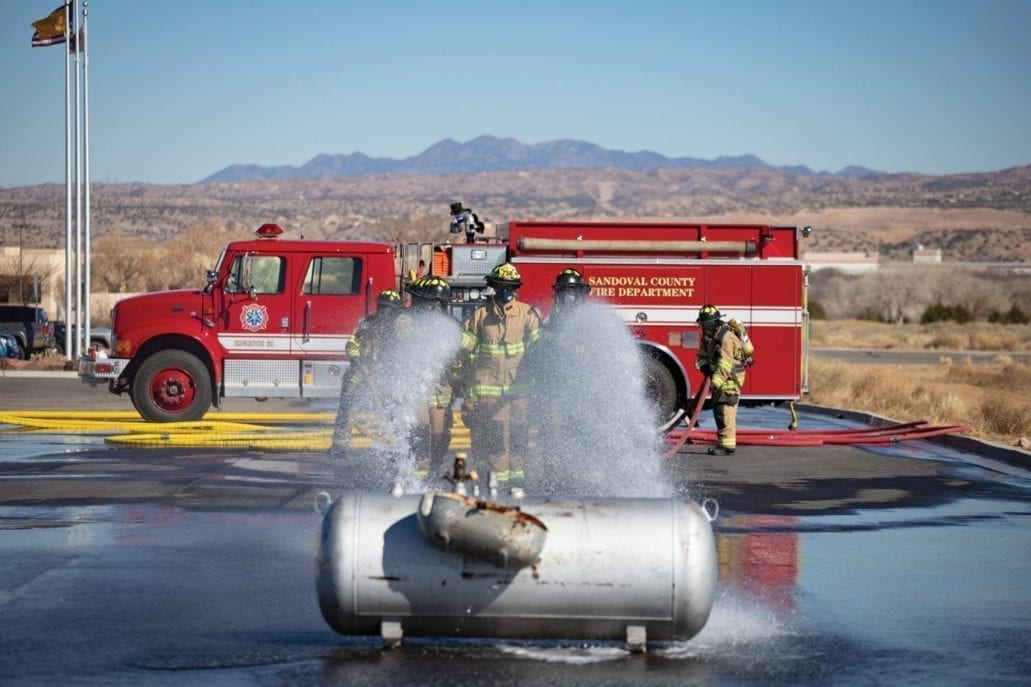Story and photos by Amy Byres with the Rio Rancho Observer
Sandoval County Fire Rescue Academy’s current cadets have a class motto of “Together as one, separated by none.”
The academy is 12 weeks of intense physical and mental training, said Battalion Chief Kenny Snow. The fourth class of cadets is training now.
“The first five to six weeks of the academy is about helping (cadets) find that inner strength and push through things that are uncomfortable,” he said.
They have to wear heavy gear and use self-contained breathing apparatus, both of which are uncomfortable, and they have to push through mental challenges, he said.
“Once they pass those mental roadblocks, that is when we see people really start to strive,” Snow said.
The third week is the most challenging because the physical exhaustion has set in, he said.
“That is when the biggest hurdle really starts, and that’s when we usually see cadets start to struggle a little bit; so that is when they need the most help to break through that,” Snow said.
Cadet Kia Bridges mentally focuses on the task at hand and clears her mind. She applied to the academy after completing her internship at the county to graduate from paramedic school.
“I was just really impressed by everybody who works here and the professionalism and even the job itself, and they just happened to be going through the hiring process when I was completing my internship, so I applied and I got in,” she said.
Bridges completed paramedic school during the pandemic, meaning she had to complete much of her education online. The academy has made changes for COVID, but most of the education and training remain in-person.
The academy uses COVID-safe policies requiring mask-wearing when cadets are not physically training, daily health screening and regular testing. Cadets received their first Pfizer vaccine shots at the beginning of the coursed.
The hands-on environment has been a beneficial experience, Bridges said.
“It is really nice to have an environment where you can put your hands on things and see things happening, and doing these training evolutions really solidifies the information, so that’s been good, and it’s been a good learning environment for that reason,” she said.
Academy is rigorous
Bridget said going through the academy is an intense experience physically and mentally.
To help break through mental walls, during the academy’s orientation, cadets are taught skills to cope and take care of their bodies outside of the academy. The cadets’ families are also prepared to better support their future first responders.
“We also have a family night — this time we did it on Zoom — to kind of prepare their family so they understand what it is going to take from the family to help them be successful, because it is a challenge on the family as well,” Snow said.
“They get very little time with (family) and when these cadets get home, they are doing their homework and then they are going to bed so they can get up early and do it again.”
Throughout the academy, cadets have informal weekly meetings where leadership checks in to see how they are doing mentally and physically, how life is at home and outside of the home.
“Outside of the academy in general, it is really hard on them and their families because they don’t really have a lot of time. We work four 10-hour days, but they have homework every night and every weekend,” he said.
Snow said teamwork is the key to the success of each graduating class.
“As they start to struggle, we really focus on helping them learn they have to work as a team, and that’s where we have problems in the very beginning, where they try to do things individually or one cadet struggling, and they are learning how to support each other,” he said.
The academy utilizes positive reinforcement and uses physical training as a learning tool when mistakes are made, he said.
“This is only going to be as easy as you make it and when you decide you are going to work together as a group,” he tells the cadets.
If a cadet is really struggling, Snow will break the group into engine companies, take the leader of each company and give them ideas on how they can help the struggling individual and make them a more cohesive team.
“It is crazy to see — and sometimes it’s easy to forget — things that you take for granted that you just think you should know. To think back and remember, I didn’t know how to do that, either. We have to really focus. It is cool to see every day they grow a little bit and things get a little easier and so that’s been cool,” Snow said.
Every class is different
“We started with eight cadets and we lost two in the beginning — it just wasn’t for them,” he said. “Some of the things that are interesting about this class is: One, it is a 50/50 class between male and female.”
This is the first time a class has been even between females and males. Because of this, Snow has been able to split them into two companies for a friendly battle of the sexes.
“It has been interesting to see a little bit of competition between the two of them, which has been good, but that’s been a dynamic we haven’t seen before. Normally it’s heavily male and one or two females, so that’s been a change,” he said.
In addition, this class of cadets is unique because it is an older group, Snow said.
“We have one young cadet that is 23. The rest of them are late 20s, early 30s, and they have actually strived and I think that life experience helped them,” he said. “We have really been able to focus on the skills and education and really just driving them forward, which has been a good thing for us.”
The cadets completed their eighth week of training and are expected to graduate in April.

